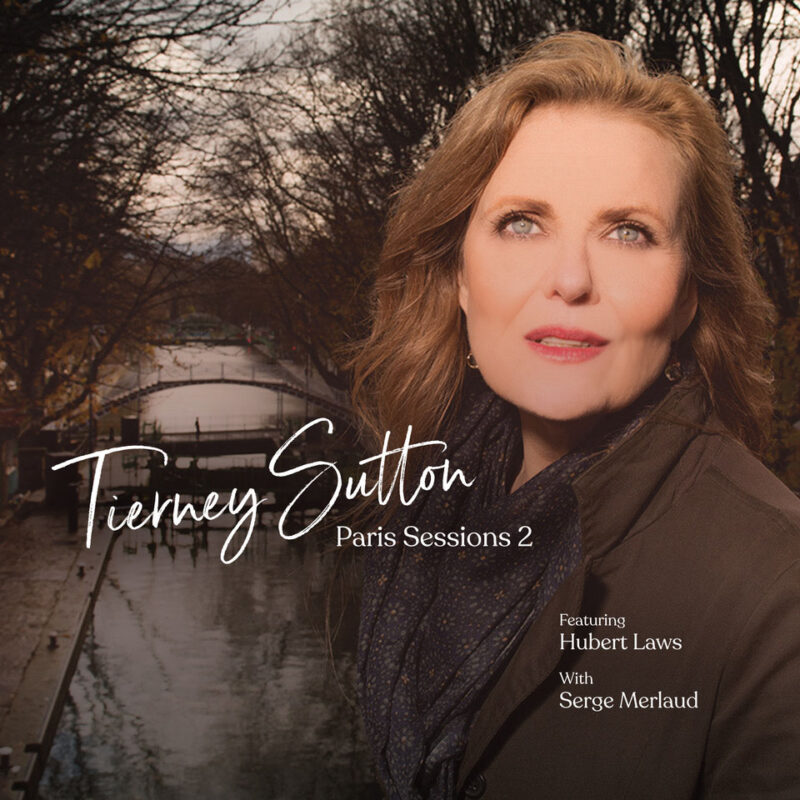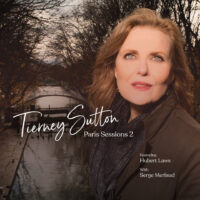Time just scats on by when one is caught up in the wave of creativity that defines Tierney Sutton. How could it be that this enchanted vocalist is now presenting her fifteenth album? She left indelible footprints on her debut record, Introducing Tierney Sutton (A Records, 1997), breezing through as the leader of her caravan of wonder and possibilities. Sutton certainly has grown, as any artist would over time, but it was clear from the beginning that she knew who she was and where she was going. Assured of her pathway, Sutton has been free to focus her energy on refinement and connectivity. Sutton is not one for idle experimentation, but rather one who brings her style, her calling, her impressionistic core to every song. She doesn’t need original material. Every jazz classic is anew when Sutton takes it into her heart and soul and voices it back after in”tiern”alizing it. It’s not entirely certain whether The Great American Songbook has benefited Sutton the most or if, conversely, the material , with such a perceptive breath of fresh air, has been the true beneficiary of their liaison. The Songbook plus one, that being Canadian vocalist and composer Joni Mitchell, are once again radiantly presented as only Sutton can.
The original adornments on Paris Sessions (BFM Jazz, 2007) were remarkable, so it made sense to take another stroll through Luxembourg Gardens for more inspiration. Long time collaborators, bassist Kevin Axt and acoustic guitarist Serge Merlaud , are tightly in sync with Sutton throughout the venture. Yet it never sounds forced or arranged. Every song has the natural flow of conversation. Sutton alternately sings, scats, and uses her voice as an instrument. The brilliance of it is that it just comes out however she is feeling in that moment. The group set the tone with a lovely take on Antonio Carlos Jobim‘s “Triste,” before revisiting “April in Paris/A Free Man In Paris.” Sutton isn’t so much covering the Mitchell song, rather honoring and embracing it through her own lens. Guest flutist Hubert Laws brings his serene voice to the mix, starting with Jobim’s “Zingaro.” Joyfully, Sutton, Laws, Merlaud, and Axt glide as one in soft bossa nova.
George Gershwin and Ira Gershwin‘s “Isn’t It A Pity,” was warmly and astutely embraced by all. Sutton’s impeccable phrasing was never more exquisite. Coupled with Merlaud’s brilliant articulation , “Isn’t It A Pity,” was a superbly crafted piece of music. Sutton and Merlaud again merge as one on “Beautiful Love.” This lyrical samba was enhanced by a chordal bass solo from Axt. Sutton’s close relationship with lyricists Marilyn Bergman and Alan Bergman was honored with ambitious work on three Bergman pieces. With music written by Ennio Morricone, “Cinema Paradiso/I Knew I Loved You” is followed by “Moonlight” (John Williams wrote the music.) The Bergmans have been close friends with Sutton for many years. It’s easy to hear that sentiment in every line. Marilyn Bergman passed away in January of 2022. A heartfelt rendering of the Bergman’s “A Child Is Born”(music composer Dave Grusin) was impactful and featured Laws cascading the music as it billowed away with dignity and grace. Stoically, Sutton shared her vulnerability by embracing her feelings and channeling them into a very real and touching moment.
“Pure Imagination” would seem to be a perfect song to fit Sutton’s ability to reimagine. It was indeed the game winning home run one might have expected. Merlaud’s captivating guitar entry opens into a wondrous embrace with Sutton. Merlaud alternately duos with Sutton’s voice and scat. Their exchanges on “Pure Imagination” are stunning. Sutton often uses her voice as an Instrument. Here, Sutton penetrated with such emotion on the second verse that one feels as if the magic land of pure imagination is right there at one’s fingertips. She is not a singer with a band behind her. She is part of the band. Her voicings are treated by her bandmates as an additional player. A trio becomes a quartet, a quartet becomes a quintet.
Moving into a more upbeat direction, “Doralice” has the band grooving. Sutton, Merlaud, and Axt are in tight with cerebral conversation. “August Winds” was impeccably performed in colorful fashion. Axt stretching out into a melodic bass solo. Cole Porter gets in on the act with Sutton’s reimagining of his “You’d Be So Nice To Come Home To.” Sutton’s signature approach was as if meant to be on this one. Fascinating to hear the minds of Porter and Sutton converge as if they were working side by side. Sutton lets her band fly on the last tune, entitled “Chorado.” Laws saved his best solo for last, as the band punctuated a fine recording.
Once again, Sutton has reshaped and reinvented the past into a modern outlook. Precious memories remain intact, but are also viewed and heard with a fresh perspective. C’est magnifiique.







